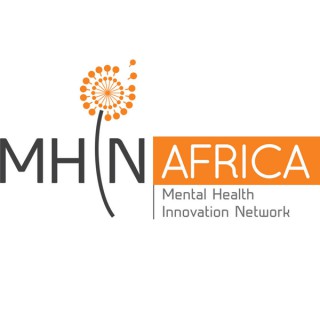
Mental Health Innovation Network Africa
Follow Mental Health Innovation Network AfricaThe first regional network of the Mental Health Innovation Network (MHIN), MHIN Africa is an online platform for African mental health innovators, researchers, practitioners, policy-makers, service user advocates and donors. MHIN Africa aims to: Provide support for African mental health innovators…
- Nov 4, 2018 LATEST EPISODE
- infrequent NEW EPISODES
- 51m AVG DURATION
- 5 EPISODES
More podcasts from MHNR Network, LLC
Latest episodes from Mental Health Innovation Network Africa

For #WorldMentalHealthDay 2018, Asanda Mcoyana, Communications Officer at MHIN Africa, sat down to chat with the coordinator of the Mentally Aware Nigeria Initiative (MANI)Virtual Mental Health Summit 2018, Rasheedat Olarinoye, to hear more about the summit which started on the 1st of October and will last throughout the rest of the month.The summit, which is said to be the largest virtual mental health summit in Africa, is taking place on WhatsApp Messenger, Twitter and on Instagram Live under the theme “Mental Health, Social Media and Technology.bit.ly/2pKLkbt

Seminar 2: Beyond the Right to Life: Disability Personhood and Participation
This podcast is an audio recording of the 2nd seminar in the seminar series that was linked to the Deadly Medicine Travelling Exhibition (22 February - 26 March 2018) of the Cape Town Holocaust Centre. Seminar two was titled "Beyond the Right to Life: Disability Personhood and Participation" and was held at Stellenbosch University on the 7th May 2018.00:00 - 3:41: Opening by the Director of the South African Holocaust and Genocide Foundation and the Cape Town Holocaust Centre, Mr Richard Freedman3:50 - 5:44: Christina Teichman, Project Manager at the Konrad Adenauer Foundation5:52 - 11:09: Chairperson Prof Leslie Swartz from the Department of Psychology, Stellenbosch University11:17 - 34:26: Judith McKenzie - Associate Professor and Head of the Disability Studies Division at the University of Cape Town (UCT) in the Department of Health and Rehabilitation Sciences35:59 - 59:30: Chaeli Mycroft - Internationally recognised ability activist. She is registered for a PhD in Human Rights Law at UCT1:00:59 - 1:16:54: Bongani Mapumulo - Head of the Disabled Students’ Society at Stellenbosch University1:18:16 - 1:41:15: Dr Brian Watermeyer - Disability scholar and disabled (severely, visually impaired) activist. He teaches on postgraduate programmes in disability and clinical psychology, as well as guest lecturing in medicine and rehabilitation science

This podcast is Part Two of an audio recording of the first of two seminars in the seminar series that was linked to the Deadly Medicine Travelling Exhibition (22 February - 26 March 2018) of the Cape Town Holocaust Centre. Seminar one was titled “Deadly Practices: Esidimeni and beyond” and was held at Stellenbosch University on the 16th of April 2018.Part two consists of a panel discussion by the speakers answering questions from the audience on the floor. Speakers, in no particular order, were:Chair: Leslie SwartzAnnie Robb on the facts of what happened, the process and the activism around itCharlene Sunkel on placing Esidimeni in the global mental health contextCharlotte Capri on “Esidimenis are going on all the time”Bonga Chiliza on the responsibilities of health professionals and the state in the wake of the tragedy.

This podcast is Part One of an audio recording of the first of two seminars in the seminar series that was linked to the Deadly Medicine Travelling Exhibition (22 February - 26 March 2018) of the Cape Town Holocaust Centre. Seminar one was titled “Deadly Practices: Esidimeni and beyond” and was held at Stellenbosch University on the 16th of April 2018.Part one consists if short presentations of the speakers about their work as follows:00:00 - 5:36: Opening by the Director of the South African Holocaust and Genocide Foundation, Mr Richard Freedman 5:40 - 9:45: Christina Teichman, Project Manager at the Konrad Adenauer Foundation9:55 - 15:46: Chairperson Prof Leslie Swartz from the Department of Psychology, Stellenbosch University15:59 - 30:15: Annie Robb on the facts of what happened, the process and the activism around the Esidimeni tragedy where 144 mental health patients died after being moved from Life Esidimeni hospital to unlicensed NGOs31:38 - 46:23: Charlene Sunkel on placing Esidimeni in the global mental health context47:45 - 1:06:14: Charlotte Capri on “Esidimenis are going on all the time”1:07:08 - 1:23:18: Prof Bonga Chiliza on the responsibilities of health professionals and the state in the wake of the tragedy

Interview with GMHPN founder Charlene Sunkel by Asanda Mcoyana of MHIN Africa
Asanda Mcoyana, Communications Officer at MHIN Africa sat down for a podcast interview with the founder of the Global Mental Health Peer Network, Charlene Sunkel describing the network, its origin and how to use the network.The GMH Peer Network was recently launched at the 5th Global Mental Health Summit that took place in Johannesburg, South Africa in February 2018. Charlene Sunkel is also the Programme Manager for Advocacy & Development at the SA Federation for Mental Health as well as the Principal Coordinator for the Movement for Global Mental Health.Contributor(s): Asanda McoyanaCharlene SunkelMHIN Africa

















